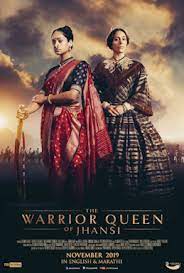
THE WARRIOR QUEEN
UK, 2019, 102 minutes, Colour.
Devika Bhise, Rupert Everett, Nathaniel Parker, Ben Lamb, R. Bhakti Klein,Omar Malik, Jodhi May, Derek Jacobi.
Directed by Swati Bhise.
In many ways, this looks like one of those popular adventures from the 1950s, the era when Cinemascope was introduced, leading to many widescreen action spectaculars. However, the theme of the film, the warrior Queen of Jhansi, who played such an important role in the Indian Mutiny of the 1850s, training and leading female soldiers, is much more 21st-century. So is the critique of the British Empire, the behaviour of the British in India over several centuries, the presumptuous colonial and superior attitudes, but, at this time, principally the exploitation of the East India Company.
Which means then that, while we appreciate the battle sequences, there are more themes to reflect on.
The title character is played by American actress, Devika Bhise, who is the daughter of the writer-Dir, Swati Bhise, an artistic entrepreneur. It is a hard role because in the early sequences showing her childhood in the court of Jhansi, tutored in arms by her father, then her marriage, death of her son, adoption of a view as the air, and growing up and training her female warriors, she is something of a strongly fierce figure. However, as the action goes on, her involvement in uprisings, battles, conflict with the British, defeats, she is a symbolic figure because of her rebellion but a tragic figure because of her defeats.
The production values of the film are quite high, especially the recreation of the courts of India and their culture in the 19th century.
There are sequences in Balmoral Castle where Prime Minister, Lord Palmerston,, comes to visit Queen Victoria (Jodie may), his exposure dating very superior attitudes about the British, about the archaic traditions of India, the need for “civilising” the people of the subcontinent. His played by Derek Jacobi. It is interesting that the screenplay includes the Indian Muslim advisor to her Majesty (taking up the theme of Victoria and Abdul, his presence 30 years after the present events).
And the British? They have occupied India for several centuries. The East India company, presided over by the greedy business and restored aristocracy of London, profit at all costs, have no sympathy, let alone empathy, for the Indians. Their representative, Hamilton, played with sinister relish by Nathanial Parker, present with the soldiers, scheming, using spies, contempt for the Indians. There are some sympathy in the character of the British commander, Sir Hugh Arose, played by Rupert Everett, who has some admiration for his opponents, a quotation from hitting in the final credits praising the Variety. There is also a sympathetic military translator, played by Ben Lamb.
Intentions for the film are very worthy. However, it plays as a reasonable, if fairly ordinary, Port of the times, the conflicts, the politics, the warfare, downfall of the East India company and, the reminder that, 90 years later, India achieved independence.
- The title? India, the 1850s, the heritage of British presence, the East India Company? Revolution? The Indian Mutiny of the 1850s? The leadership of the Rani?
- The settings, lavish, costumes and decor, the civilisation of the Indian kingdoms, contrast with the British military, presence, battles? The musical score?
- The structure of the film, the focus on the mutiny, the flashbacks to the childhood of the Rani, her voice-over and explanations, bond with her father, commoner, marrying, child, death of the child, adoption of the nephew, the continuity of rulers? Her becoming the Queen?
- The British situation, the issue of the Enfield rifles and the pork and beef fats, the revolt, murdering British officials? The reaction in London? The meeting of the East India company and its presumptions, hostility towards India, profit-Ames? Lord Palmerston, his visits to the Queen, his presumptions about Empire, the Queen and her hesitancy, a Muslim advisor and his presence, comments, Palmerston’s reactions? The Queen disturbed by the situation?
- The British military, the leadership of Sir Hugh Rose, his manner, beliefs, leadership, assessing the situation, strategies? The presence of Hamilton, Superior, vindictive, the Company? The presence of Ellis, his role as a translator, knowing and admiring the rani from the past, is delivering messages, advised to negotiate, failure to persuade the rani, Hamilton suspicious of his loyalties?
- The rani, preparations for war, the local kingdoms, siding with the British, changing stances, the bombardment of the walls of Jhansi, escape, the decoy and Hamilton’s misjudgment, the fights, British superior weaponry? The rest of the rani’s father, his execution?
- The final confrontation, the Rani having to flee – and her final comments about what happened to her, death, living on, reappearing in battles, a symbol of encouragement?
- The final information about her, about the British, the closing down of the East India Company, and the reminder that 90 years later India was independent.